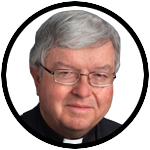
Father Kenneth Doyle
Q. I attended Catholic schools for 12 years, and I view that experience as a prime factor in my success in life. In 1966 when I was confirmed, I took George as my confirmation name. Shortly after that, my class was told that many saints never existed and that George was one of them.
Our teacher explained that George was a folklore hero — a cultural myth much like Paul Bunyan, who existed only in storybooks. (Strangely, though, we were told that we could still pray to him.) I’m wondering whether there is any new thought on this and what the current state of sainthood is for good old St. George. (Owings Mills, Maryland)
A. Whoever told you that St. George never existed was wrong. He was born to a Christian family in Lydda in Palestine in the late third century and became an officer in the Roman army. When the emperor Diocletian decreed that every soldier should renounce Christianity and offer sacrifice to the Roman gods, George refused — the result being that he was decapitated for professing his faith, most likely in the year 303 A.D.
[hotblock]
From that time on, Christians revered him as a martyr, and a basilica was later built in his honor in Lydda. That much is factual, but the legend of George as a dragon slayer, a story carried back to Europe by the Crusaders in the 12th century, seems to have little basis in fact.
The confusion over the status of George arises, in part, from a 1969 revision in the church’s liturgical calendar when it was decided that some names should be removed from the calendar of the saints and several others, including St. George, should have their feast day celebrations made optional.
That change was the logical consequence of the Second Vatican Council’s determination in its decree on the liturgy that “lest the feasts of the saints take precedence over the feasts that commemorate the very mysteries of salvation, many of them should be left to be celebrated by a particular church or nation or religious community; only those should be extended to the universal church that commemorate saints who are truly of universal importance” (“Sacrosanctum Concilium,” No. 111).
On April 23, 2013, just a month after his election as pontiff, Pope Francis joined several cardinals in celebrating Mass in a Vatican chapel in honor of his patron saint on St. George’s feast day. (The pope’s baptismal name is Jorge.)
Q. Is there a limit as to how often one can receive the sacrament of the anointing of the sick? Our church now administers this sacrament monthly. My husband will be facing several procedures over the next few months. Is he allowed to receive this blessing each month there is a procedure or only once a year? (Jeffersonville, Indiana)
A. In the 1960s when the Second Vatican Council changed the preferred name from extreme unction to anointing of the sick, that change was meant to indicate a change in purpose — or rather, a return to this sacrament’s original purpose. No longer was it to be administered only at the point of death but to those whose illnesses, though serious, were not immediately life-threatening.
The frequency for receiving this sacrament is a matter of judgment, but some guidelines exist. In No. 998 of the church’s Code of Canon Law, we read that the sacrament is intended for “the faithful who are dangerously ill.”
However, the Catechism of the Catholic Church clarifies that and expands on it in No. 1515: “It is fitting to receive the anointing of the sick just prior to a serious operation. The same holds for the elderly whose frailty becomes more pronounced.” The rite of anointing itself says that “old people may be anointed if they are in weak condition even though no dangerous illness is present.”
It’s important, I think, not to limit “illness” to the physical. Every priest I know would welcome to the sacrament those in the throes of psychological depression or struggling with an addiction.
Now, as to your specific question: In offering the sacrament monthly, your parish is not suggesting that the same people receive it every month but that there are probably new candidates each time. That could mean people newly diagnosed or whose situations have worsened or who are facing serious surgery.
I do not know what procedures your husband will undergo, but certainly if they involve serious risk, he could receive the sacrament each time. The Code of Canon Law encourages erring on the side of caution. In No. 1005, it says that the sacrament is to be administered in a case of doubt whether the sick person is dangerously ill.
***
Questions may be sent to Father Kenneth Doyle at askfatherdoyle@gmail.com and 40 Hopewell St. Albany, N.Y. 12208.
PREVIOUS: Papal document shows mercy as medicine on life’s battlefields
NEXT: Motherhood, fatherhood at heart of America’s founding principles



Father, I married in a Lutheran church but I continue to go to a Catholic Church, can I still take take communion, my husband is Lutheran but also goes to the Catholic Church with me.